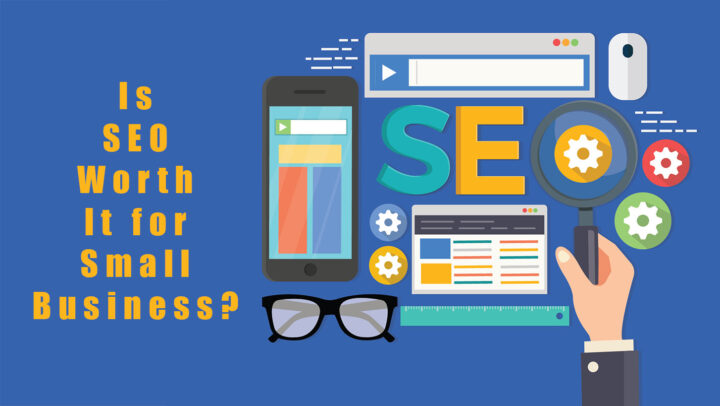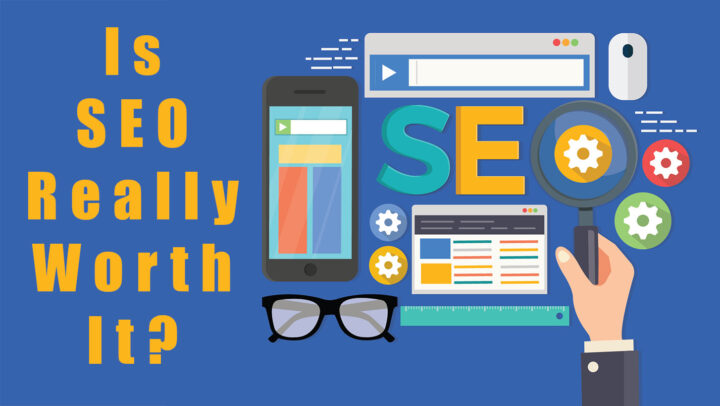
Is SEO Worth It For Small Business?
SEO is a great investment for many small businesses. It’s a relatively affordable to make your small business easy to find online, and your website easy to use. SEO (search engine optimization) works for small businesses and can be worth it for many reasons, including:
SEO helps small businesses appear at the top of search results, increasing visibility and brand awareness. According to a study by Chitika, the top listing in Google’s organic search results receives 33% of the traffic, compared to 18% for the second position. For example, a small business ranking first for a high-volume keyword could see a significant increase in website visits, leading to greater brand recognition and customer loyalty. [Source: Chitika]
A study by BrightEdge found that organic search is the largest driver of web traffic, accounting for 53.3% of all visits. For a small business, this means that investing in SEO can lead to a substantial increase in website traffic. For instance, if a business sees 5,000 monthly visitors, SEO could potentially increase that number to over 7,600, driving more potential customers to the site. [Source: BrightEdge]
A study by MarketingSherpa found that organic search leads have a 14.6% close rate, compared to 1.7% for outbound leads. For a small business generating 500 leads per month, SEO could convert about 73 leads into sales, compared to just 8.5 from outbound methods. This highlights the effectiveness of SEO in attracting high-quality leads that are more likely to convert. [Source: MarketingSherpa]
Google reports that 61% of mobile searchers are more likely to contact a local business if they have a mobile-friendly site. For small businesses, optimizing their website for mobile search can significantly increase the likelihood of attracting local customers. For example, a small restaurant could see a notable increase in reservations and foot traffic by ensuring its site is mobile-friendly. [Source: Google]
According to Demand Metric, inbound marketing, including SEO, costs 61% less per lead than outbound marketing. For a small business spending $20 per lead on outbound marketing, SEO could reduce this cost to around $7.80 per lead, significantly lowering overall marketing expenses while maintaining or even increasing lead quality. [Source: Demand Metric]
A study by Ahrefs found that 60% of pages ranked on the first page of Google are three or more years old, demonstrating the long-term benefits of SEO. For small businesses, this means that an initial investment in SEO can yield results for years to come, providing a consistent stream of traffic and leads without ongoing costs. [Source: Ahrefs]
According to Google, 28% of searches for something nearby result in a purchase. For a small business, optimizing for local search can significantly increase local customer engagement and sales. For instance, a local bakery could see a surge in foot traffic and orders from customers finding them through local search queries. [Source: Google]
A survey by Edelman found that 81% of consumers need to trust a brand to buy from them. High search rankings can help build this trust, as consumers often perceive top-ranked sites as more credible. For a small business, achieving high rankings through SEO can enhance customer trust and loyalty, leading to repeat business and word-of-mouth referrals. [Source: Edelman]
SEO tools and analytics provide small businesses with valuable insights into customer behavior and preferences. For example, Google Analytics can show which keywords are driving traffic, which pages are most popular, and where visitors are coming from. These insights allow businesses to refine their strategies and improve their offerings to better meet customer needs. [Source: Google Analytics]
A study by Forrester found that SEO offers a higher ROI than traditional forms of marketing. For a small business with a limited marketing budget, this means that every dollar spent on SEO can yield more returns compared to other marketing strategies. For instance, if a business invests $5,000 in SEO, it could see returns exceeding $50,000, making it a highly effective and efficient use of resources. [Source: Forrester]
In Conclusion, SEO works for small businesses and can be worth it for many reasons.
https://chitika.com/insights/2013/the-value-of-google-result-positioning/
https://www.brightedge.com/resources/webinars/2020/01/q1/seo-performance-impact-webinar
https://www.marketingsherpa.com/article/chart/marketing-methods-generate-highest-volume-quality-leads
https://www.thinkwithgoogle.com/consumer-insights/consumer-trends/mobile-search-trends/
https://www.demandmetric.com/content/content-marketing-infographic
https://ahrefs.com/blog/seo-statistics/
https://www.thinkwithgoogle.com/consumer-insights/consumer-trends/local-search-trends/
https://www.edelman.com/trust-barometer
https://analytics.google.com/analytics/web/
https://go.forrester.com/blogs/why-user-experience-the-most-important-metric-youre-not-measuring/
Boosts Brand Awareness
SEO helps small businesses appear at the top of search results, increasing visibility and brand awareness. According to a study by Chitika, the top listing in Google’s organic search results receives 33% of the traffic, compared to 18% for the second position. For example, a small business ranking first for a high-volume keyword could see a significant increase in website visits, leading to greater brand recognition and customer loyalty. [Source: Chitika]
Increases Website Traffic
A study by BrightEdge found that organic search is the largest driver of web traffic, accounting for 53.3% of all visits. For a small business, this means that investing in SEO can lead to a substantial increase in website traffic. For instance, if a business sees 5,000 monthly visitors, SEO could potentially increase that number to over 7,600, driving more potential customers to the site. [Source: BrightEdge]
Improves Conversion Rates
A study by MarketingSherpa found that organic search leads have a 14.6% close rate, compared to 1.7% for outbound leads. For a small business generating 500 leads per month, SEO could convert about 73 leads into sales, compared to just 8.5 from outbound methods. This highlights the effectiveness of SEO in attracting high-quality leads that are more likely to convert. [Source: MarketingSherpa]
Enhances Mobile Reach
Google reports that 61% of mobile searchers are more likely to contact a local business if they have a mobile-friendly site. For small businesses, optimizing their website for mobile search can significantly increase the likelihood of attracting local customers. For example, a small restaurant could see a notable increase in reservations and foot traffic by ensuring its site is mobile-friendly. [Source: Google]
Reduces Customer Acquisition Costs
According to Demand Metric, inbound marketing, including SEO, costs 61% less per lead than outbound marketing. For a small business spending $20 per lead on outbound marketing, SEO could reduce this cost to around $7.80 per lead, significantly lowering overall marketing expenses while maintaining or even increasing lead quality. [Source: Demand Metric]
Drives Long-Term Growth
A study by Ahrefs found that 60% of pages ranked on the first page of Google are three or more years old, demonstrating the long-term benefits of SEO. For small businesses, this means that an initial investment in SEO can yield results for years to come, providing a consistent stream of traffic and leads without ongoing costs. [Source: Ahrefs]
Increases Local Customer Engagement
According to Google, 28% of searches for something nearby result in a purchase. For a small business, optimizing for local search can significantly increase local customer engagement and sales. For instance, a local bakery could see a surge in foot traffic and orders from customers finding them through local search queries. [Source: Google]
Builds Customer Trust and Loyalty
A survey by Edelman found that 81% of consumers need to trust a brand to buy from them. High search rankings can help build this trust, as consumers often perceive top-ranked sites as more credible. For a small business, achieving high rankings through SEO can enhance customer trust and loyalty, leading to repeat business and word-of-mouth referrals. [Source: Edelman]
Provides Valuable Insights
SEO tools and analytics provide small businesses with valuable insights into customer behavior and preferences. For example, Google Analytics can show which keywords are driving traffic, which pages are most popular, and where visitors are coming from. These insights allow businesses to refine their strategies and improve their offerings to better meet customer needs. [Source: Google Analytics]
Maximizes Marketing ROI
A study by Forrester found that SEO offers a higher ROI than traditional forms of marketing. For a small business with a limited marketing budget, this means that every dollar spent on SEO can yield more returns compared to other marketing strategies. For instance, if a business invests $5,000 in SEO, it could see returns exceeding $50,000, making it a highly effective and efficient use of resources. [Source: Forrester]
In Conclusion, SEO works for small businesses and can be worth it for many reasons.
Sources:
https://chitika.com/insights/2013/the-value-of-google-result-positioning/
https://www.brightedge.com/resources/webinars/2020/01/q1/seo-performance-impact-webinar
https://www.marketingsherpa.com/article/chart/marketing-methods-generate-highest-volume-quality-leads
https://www.thinkwithgoogle.com/consumer-insights/consumer-trends/mobile-search-trends/
https://www.demandmetric.com/content/content-marketing-infographic
https://ahrefs.com/blog/seo-statistics/
https://www.thinkwithgoogle.com/consumer-insights/consumer-trends/local-search-trends/
https://www.edelman.com/trust-barometer
https://analytics.google.com/analytics/web/
https://go.forrester.com/blogs/why-user-experience-the-most-important-metric-youre-not-measuring/
0

